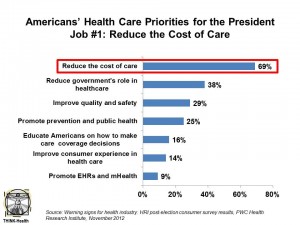
Reducing health care costs far outranks improving quality and safety, improving the public’s health, and upping the customer experience as Americans’ top priority for President Obama’s health care agenda, according to a post-election poll conducted by PwC’s Health Research Institute.
In Warning signs for health industry, PwC’s analysis of the survey results, found that 7 in 10 Americans point to the high costs of health care as their top concern in President Obama’s second term for addressing health care issues.
Where would cost savings come from if U.S. voters wielded the accountant’s scalpel? The voters have spoken, saying,
- Reduce payments to health care providers, hospitals and doctors, cited by one-half of survey respondents
- Cutting investments in health IT, according to 42% of U.S. voters
- Reduce spending on public health and prevention, 31%
- Raise the Medicare eligibility age for seniors, 29%
- Reduce Medicaid and other subsidized care for low-income Americans, 27%
- Cut investments in research and development for new medicines and therapies, 21%.
There’s a Mars/Venus difference in Americans’ health agenda priorities. Women tend to prioritize public health and prevention investments, while more men prefer reducing government’s role in health care. In racial differences, more African Americans like the idea of more education for health decision making and improving customer experiences than Whites.
PwC polled 1,202 U.S. voters online on November 9-10, 2012.
Health Populi’s Hot Points: The big aha! moment in this poll is U.S. voters’ lack of value in health information technology investment, notwithstanding a huge government subsidy for providers’ adoption of electronic health records that was incorporated into the American Reinvestment and Recovery Act (ARRA) stimulus bill’s HITECH Act in February 2009.
More Americans have begun to see EHRs as part of their doctors’ offices and exam room experiences in the form of receiving a printout summary from their visit, or accessing personal health information on a portal. Yet a large proportion, 42%, of people polled cited “reducing investments in health IT” as the second most likely place to cut Federal health spending after reducing payments to doctors and hospitals.
Other stakeholders missing-from-action in this survey question is reducing spending on prescription drugs and medical technology, usually culprits cited by consumers under the question of reducing health costs. “Big Pharma” has been long seen has a contributor to high medical spending in other consumer health surveys.
Consumers put their own health providers at the top of the cost-cutting priority list. This, too, is a conundrum as one’s own doctor is the most trusted node in people’s personal health ecosystems. The personal doctor is also the stakeholder most well-known to the consumer. As people pay more out-of-pocket for health care, I would expect the PCP and her staff to feel the wrath of growing patient empowerment and economic force. Yet it’s a key role for the PCP in accountable care payment regimes to more closely engage with patients. Furthermore, health IT plays a pivotal role as infrastructure for accountable care. PwC’s findings do indeed signal “warning signs” for the health industry as we see stakeholders on very different pages.




 I am so grateful to Tom Lawry for asking me to pen the foreword for his book, Health Care Nation,
I am so grateful to Tom Lawry for asking me to pen the foreword for his book, Health Care Nation,  I love sharing perspectives on what's shaping the future of health care, and appreciate the opportunity to be collaborating once again with Duke Corporate Education and a global client on 6th May. We'll be addressing some key pillars to consider in scenario planning such as growing consumerism in health care, technology (from AI to telehealth), climate change, and trust -- the key enabler for health engagement or dis-engagement and mis-information. I'm grateful to be affiliated with the corporate education provider
I love sharing perspectives on what's shaping the future of health care, and appreciate the opportunity to be collaborating once again with Duke Corporate Education and a global client on 6th May. We'll be addressing some key pillars to consider in scenario planning such as growing consumerism in health care, technology (from AI to telehealth), climate change, and trust -- the key enabler for health engagement or dis-engagement and mis-information. I'm grateful to be affiliated with the corporate education provider  Thank you FeedSpot for
Thank you FeedSpot for